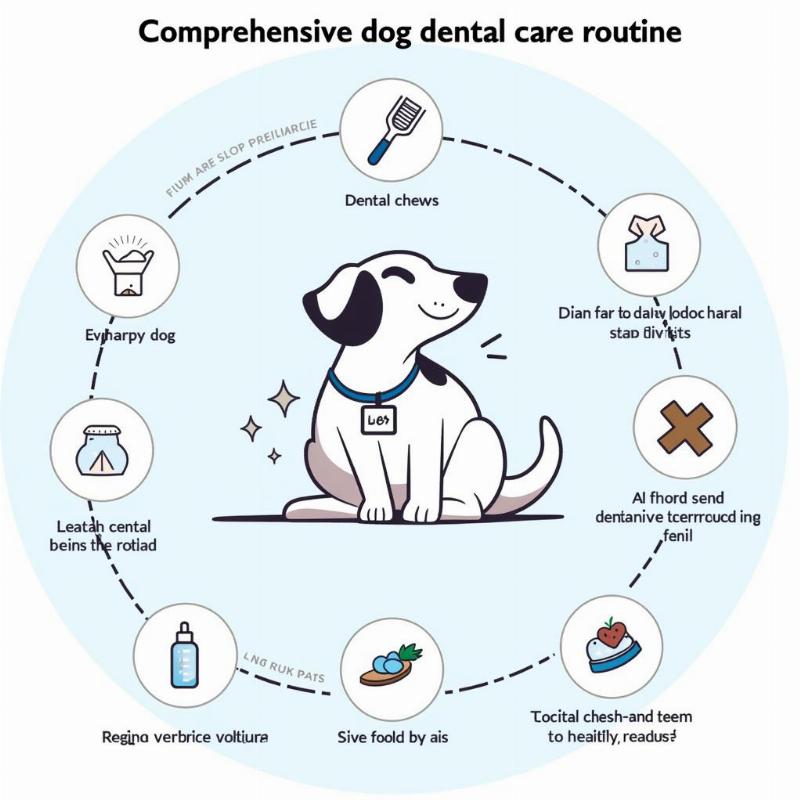Taking care of your dog’s pearly whites is a crucial part of responsible pet ownership. While brushing remains the gold standard, a spray for dog teeth cleaning can be a valuable addition to your dog’s dental hygiene routine, offering a convenient way to freshen breath and potentially combat plaque buildup. This article will explore the benefits, drawbacks, and best practices for using dental sprays, helping you make informed decisions about your furry friend’s oral health.
Understanding the Role of Dental Sprays
Dental sprays for dogs are typically formulated with ingredients designed to freshen breath, fight plaque and tartar, and promote healthy gums. Common ingredients include enzymes, chlorhexidine, and natural antibacterial agents. These sprays are not a replacement for regular brushing but can offer supplementary benefits, especially for dogs who resist brushing. They’re also handy for quick breath freshening on the go.
Choosing the Right Dental Spray for Your Dog
The American market offers a variety of dog dental sprays, and selecting the right one can be overwhelming. Look for products that carry the Veterinary Oral Health Council (VOHC) seal of acceptance. This indicates that the product has met pre-set standards for effectiveness in controlling plaque and tartar. Avoid sprays containing xylitol, a sugar substitute that is toxic to dogs. Consult your veterinarian for personalized recommendations based on your dog’s breed, age, and specific dental needs.
How to Effectively Use a Dental Spray
Using a dental spray is relatively straightforward. Most sprays are designed to be applied directly to the dog’s teeth and gums. Follow the manufacturer’s instructions carefully. For dogs who are new to dental sprays, start slowly, allowing them to get used to the taste and sensation. Positive reinforcement and treats can help create a positive association with the process.
Benefits of Incorporating Dental Sprays
Beyond freshening breath, dental sprays can offer several advantages. They can help reduce plaque and tartar buildup, which can contribute to gum disease and tooth decay. Some sprays contain ingredients that soothe inflamed gums, providing relief for dogs with periodontal issues. Dental sprays can be especially helpful for senior dogs or dogs with certain medical conditions that make brushing difficult.
Potential Drawbacks and Considerations
While generally safe, dental sprays can have some drawbacks. Some dogs may dislike the taste or the sensation of the spray. If your dog shows signs of discomfort, discontinue use and consult your veterinarian. It’s also important to understand that dental sprays are not a substitute for professional dental cleanings. Regular veterinary dental checkups and cleanings are essential for maintaining optimal oral health.
Beyond the Spray: A Holistic Approach to Dog Dental Care
A comprehensive dental care routine for your dog should involve multiple strategies. Brushing remains the cornerstone of effective plaque removal. Consider incorporating dental chews, toys, and treats that promote chewing action and help clean teeth. grain free dog dental chews are a great option for dogs with sensitivities. Regular professional cleanings by your veterinarian are also crucial for preventing and addressing dental issues.
 Holistic Dog Dental Care Routine
Holistic Dog Dental Care Routine
Conclusion: Spraying Your Way to a Healthier Smile
A spray for dog teeth cleaning can be a valuable tool in your arsenal for maintaining your dog’s oral hygiene. While not a replacement for brushing and professional cleanings, it can offer a convenient way to freshen breath, reduce plaque, and promote overall oral health. Remember to choose a VOHC-accepted product, follow the manufacturer’s instructions, and consult your veterinarian for personalized recommendations. By incorporating a dental spray into a holistic dental care routine, you can help your furry friend enjoy a healthy, happy smile for years to come.
FAQs
- Can I use human mouthwash on my dog? No, human mouthwash often contains ingredients that are toxic to dogs, such as xylitol. Always use products specifically formulated for canine use.
- How often should I use a dental spray? Follow the manufacturer’s instructions. Most sprays can be used daily or as needed for breath freshening.
- Will a dental spray cure my dog’s gum disease? No, dental sprays cannot cure gum disease. They can help manage plaque and tartar buildup but professional veterinary treatment is necessary for addressing gum disease.
- What if my dog swallows the dental spray? Most dental sprays are formulated to be safe if swallowed in small amounts. However, if your dog ingests a large amount, contact your veterinarian immediately.
- Are there any side effects of using dental sprays? Some dogs may experience mild gastrointestinal upset if they ingest a significant amount of spray. Discontinue use and consult your veterinarian if your dog shows any adverse reactions.
- Can I use a dental spray on a puppy? Consult your veterinarian before using a dental spray on a puppy. Some sprays may not be appropriate for young dogs.
- Can dental sprays replace brushing? No, dental sprays are a supplementary tool and not a replacement for regular brushing.
Related Articles
Beautdogs.us is your premier destination for all things dog-related in the US. We provide expert advice on dog breeds, grooming (dog grooming broken arrow ok), and overall pet wellness. Whether you’re a seasoned dog owner or just starting your journey, Beautdogs.us is here to help you provide the best possible care for your canine companion. Contact us today for personalized support! Email: [email protected], Phone: +1 501-555-7529.